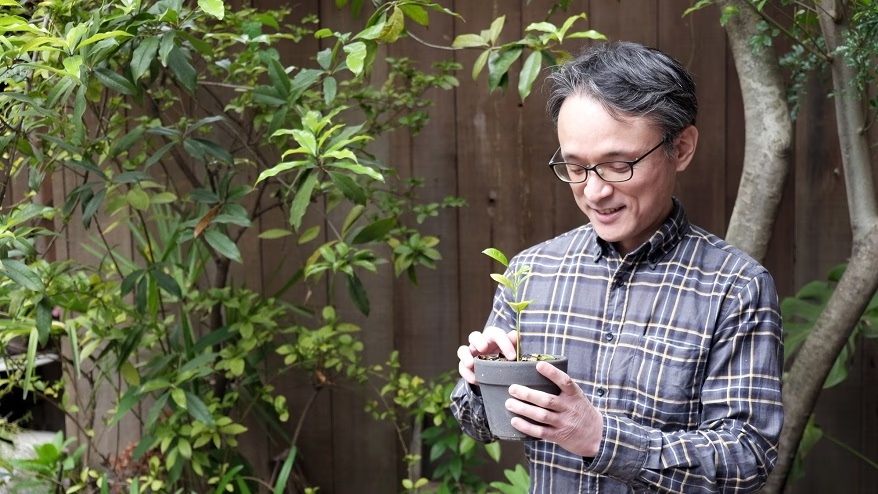こんにちは。京都在住のライター・杉本です。
ものさすサイトを通して出会う、モノサスの人たちへの興味が深まる今日この頃。今回は「町で見かける植物図鑑 ~夏編~」の記事制作時に知り合った、チェッカーのまろさんこと、村上伊左夫さんに「自由と責任 みんなの制度と働き方実験室」でインタビューをしました。
本連載では、モノサスがフルフレックス制度を導入して4年目、そしてフルリモートになってもう1年。働く時間と場所を自分たちで決められるようになったモノサスのメンバー。それぞれの自律したワークスタイルのあり方、「会社」という場、あるいは組織に対する意識の変化を聞いています。
村上さんは今、どんな働き方をしているのでしょうか。そして、これからはどんな仕事をしてみたいと思っているのでしょう。「じゃあ、ちょっと愛でていただけますか?」と植木鉢を渡して写真をパチリ、からのスタートになりました…!
「機械より正確」と呼ばれる鉄壁のチェッカー
杉本:「まろチェックは機械よりも正確だ」と言われているそうですね。昨年末にMVPを受賞されたときのコメントからも村上さんへの信頼の厚みが感じられました。だけどこのお仕事って、信頼されるほどにプレッシャーが高まるという側面はありませんか?
村上:私たちの部署はお客さまと直接やりとりすることがないので、直接クレームを受けることはないですし、ある意味では守られているんですね。とはいえ、私たちが納品したものにミスがあるともちろん問題になります。やはり日々気を抜くことはできませんね。
杉本:以前、香取さんが書かれた村上さんの紹介記事によると、「昔からイタズラ好きで、間違い探しが好き。絶対に何かを見つけてやろう」という気持ちで、チェックの仕事をされているそうですね。
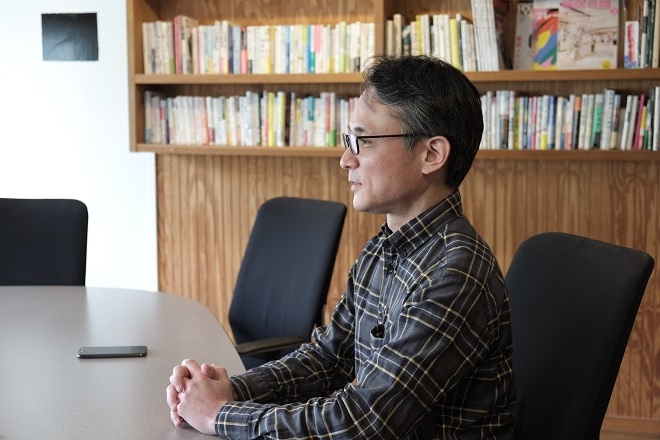
村上:もともとチェックという仕事自体は全然苦じゃないんです。ただ、何年か前には、頑張りすぎて病んでしまった時期もありました。お恥ずかしい話ですけど、何日間か無断欠勤をしてしまって。戻ってきたとき、それでもまだ会社に居場所にあったことに、一回ふつっと緊張の糸が切れちゃったというか。「自分一人でがんばらなくてもいいんだ」というと、語弊があるかもしれませんが、なんていうのかな……。
当時上司だった柵山さん(取締役)に、「あなたはよく抱え込むから、抱え込んじゃだめよ」って言われたのですが、それが体感としてわかってきたんじゃないかなと思うんですね。それからは、しんどくなっても「限界です」と旗を上げられるようになって。そういうことを一回、二回と経験して、案件ごとに「難しいな」という壁に当たることはあるけれど、それが苦痛だと感じることは減ってきたかなと思います。
杉本:苦痛だと感じるのは、責任をもって全部やりたいけれど、時間的にも体力的にも無理だという状況がのしかかってくるようなときですか?
村上:そうですね。ボリュームと、「今の自分ではスキルもレベルも全然足りない」と思っちゃったときですね。今は、そこを埋めようとがんばっているところです。
フルフレックス&フルリモートでも仕事には特に変化なし
杉本:2017年にフルフレックスが導入されたとき、それ以前の働き方から何か変化はありましたか?
村上:基本的に私たちは、案件に携わる社内のディレクターさん、あるいはコーダーさんとやりとりをして仕事をします。複数の案件が同時に走っていると、一気にドバッと重なることがあるんですね。なので、フルフレックスになったときも「チェッカーの稼働時間はある程度固めておきましょう」という話になり、勤務時間はあまり変わりませんでした。ただ、定時がなくなったので時間の融通が効くようになって、生活が楽になった部分はあったかなと思います。
杉本:昨年以降のフルリモートについてはどうでしたか。
村上:私は会社から徒歩20分くらいのところに住んでいるのですが、密になることを避けるために出社する必要がある人を優先して、私は自宅に引っ込むかたちにしていました。
杉本:会社と自宅、働きやすさに違いはありましたか。自宅だと、誰にも見られていないしダラダラしてしまう、とか。
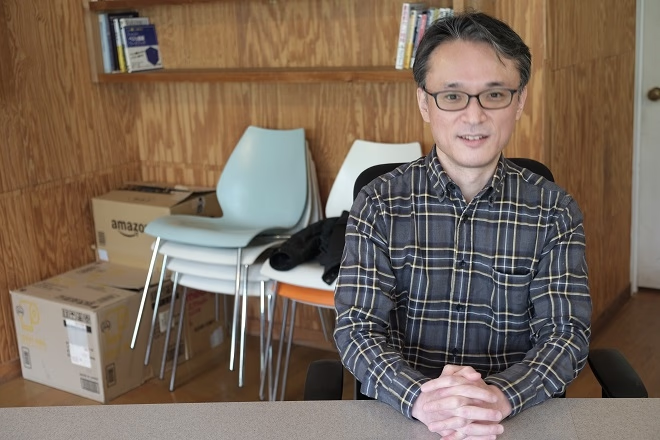
村上:そうですね。ダラダラ……、ダラダラ? まあ、仕事をしているときは、そこまでダラダラはしていないと思いますし、10時始業で19時まで働くと決めていて、あまり変わらなかったですね。
杉本:じゃあ、逆に仕事しすぎちゃうことは?
村上:仕事とプライベートの境目がなくなるってことですよね?そういう感じはなかったと自分では思っています。コロナ禍が始まった頃、仕事が少なかった時期は「早めに上がります」と連絡して切り上げることもありました。
問題だったのは、自宅ではチェックするときに使用するスマートフォンをすべて用意できないこと。私はパソコンのブラウザだけを見るようにして、スマートフォンでのチェックは他の方にお願いしたのですが、ご負担をかけてしまったのかなと思います。あと、自覚はないのですが、ひょっとしたらコミュニケーション不足はあったのかもしれません。
「モノサスなら受け入れてくれる」と思えた
杉本:自宅で仕事ができるとなると、会社がシェアオフィスみたいな感じになってくるのかなと思います。「なんでモノサスという組織に所属しているんだろう。フリーランスでもいいかも?」と思うことはないですか。
村上:いくつか消極的な理由があって。ひとつには、私はあまり変化を好まない人間なんです。あと、フリーランスになると経理や確定申告を自分でやらなければいけませんよね。そういった事務能力が自分は壊滅的だなと思っていて。けっこういい加減なところがあるんですよね、いろんなことに対して。
杉本:正確さが問われる仕事をしているけれど事務は苦手って、ちょっと意外です。
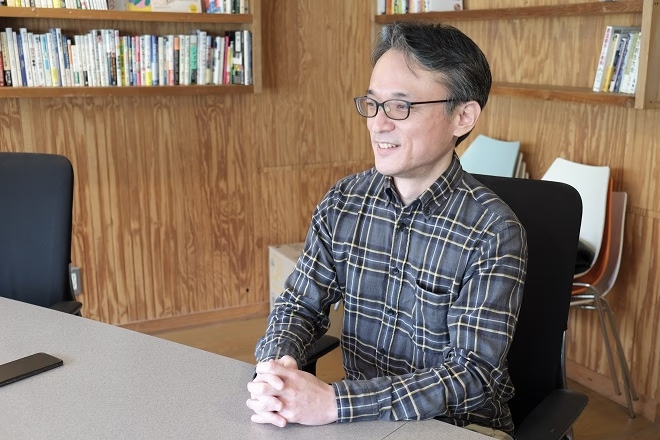
村上:自分のこだわりポイントについてはキッチリしたいんですけど、それ以外は別にどうでもいいと思っちゃうんですよね。その「キッチリさせたいポイント」を仕事に合わせているというのもありますね。
杉本:そのポイント、なかなか合わせられるものでもない気がします…! モノサスの社歴は12年にもなるそうですね。会社は自分に「合っている」と思いますか?
村上:んー。合わないときは、諦めるのが早いというか、辞めちゃうんです。でも、何かのきっかけで帰属意識をもっちゃうと、ずっとそこに居たいと思ってしまうんですよね。
杉本:村上さんが、なぜかモノサスに帰属意識をもってしまった理由ってなんですか?
村上:林さんにはすごくお世話になっているのですが、もともとすごく仲がいいという関係でもなかったんですね。大学のサークルでは1つ違いで、上下関係も厳しかったので。
モノサスに入社する前、正社員雇用ではなかったので「社会人として自立していない」という劣等感があったりしたと思うんです。そんななかで、林さんに誘われてこの会社に来て「モノサスだったら受け入れてくれるんじゃないか」という安心感みたいなものを覚えたのかもしれません。
杉本:今、さらっと言われましたけど、「ここなら受け入れてくれるんじゃないか」「ここに居続けたい」と感じられる会社に勤められるのは、すごく素敵なことだなと思いました。
村上:はい。そういう意味では、本当に恵まれているんだろうなと思っています。
「チェック」から「テスト」へと手を伸ばしていきたい
杉本:これから、仕事で目指したいことはありますか?
村上:ひとつは、これまで私たちがやってきているのは「テスト」ではなく「チェック」だったんですね。違いを明確に分けるのは難しいのですが、文言やデザインと突き合わせてどれだけ正確かを見る「チェック」だけでなく、システムに入ったときにどう動くのかを「テスト」する分野にまで手を伸ばしていけたらいいなと思っています。
MVPをいただいたときに推薦してくださった丸山さんの案件が、ちょうどそういう内容で今もその続きをやっているところです。今はまだ一人でやるにはレベルが足りないのですが、今後はテストのパタンなどを設計できるようになりたいなと思います。
杉本:また新たな成長をしなければいけないですね。その仕事は楽しいですか?
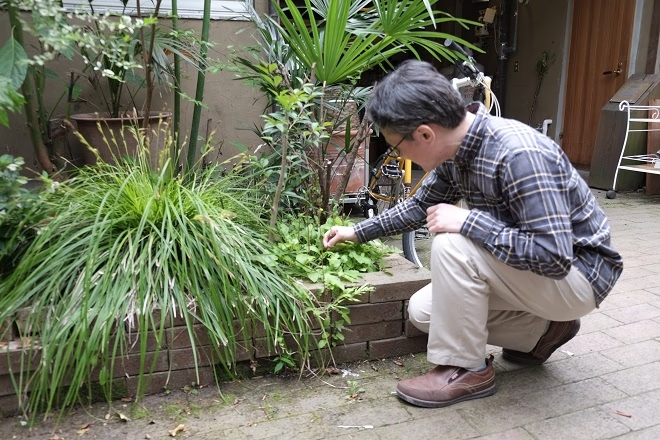
村上:楽しいんだろうなと思います、やっぱり。自分はあんまり仕事のやりがいとかを感じない人間なんですけども。
杉本:はい(笑)。
村上:うん。楽しいんだと思います。
杉本:「仕事にやりがいを感じない」と言われると「え?」ってなるけれど、村上さんが言うと「この人仕事にやりがい感じてなさそう!」とは思わないのはなんでだろう……。
村上:たぶん「やりがい」と言うのは、あの……。たとえば、家庭をもっていたら「子どものために」というのがあるかもしれません。そういった、「誰か/何かのためにがんばろう」というものがないのが「やりがい」を感じられない理由なのだろうかと考えています。もちろん、仕事上では同僚や会社、お客さま、あるいはWeb業界のためにということはあると思いますが、それとは別に個人的な面での「誰か/何か」を求めているのかなと思います。もしかしたら「やりがい」と言うよりも「生きがい」の話かもしれませんね。
たぶん、「楽しい」と感じている部分というのは、自分がレベルアップしていけると感じられるからなんだろうなと今は思っています。でもそれは自分だけの話ですから、これからまた変わって行きそうな部分かなと思っているんですけど。
杉本:レベルアップする部分が楽しいと今は思っているけれども、そうではないことを楽しいと思うかもしれないという予感があるんですか?
村上:私は世の中のことにはすべて正解があると思っているタイプの人間で。自分がやっていることが、世の中の正解に対してマッチしているかどうかを気にしてしまうんですよね。でも、がんばろうと思える「誰か/何か」ができれば、それが判断基準になって、あやふやな「世の中の正解」などというものに振り回されることもなくなるのではないか、と期待しているのかもしれません。
「誰か/何か」なんてなくったって自分のことだけで十分という考えもあるでしょう。まず目の前の仕事をしっかりやることが大事で、もちろんおろそかにするつもりはありませんが、本当にそれだけいいのかなと、煮え切らない感じなのです。
「正解」は関わっている人たちがつくるもの、かもしれない。
杉本:「世の中のことに正解がある」というときの「世の中」ってなんですか?
村上:狭く言えば会社のなか、あるいはWeb業界かもしれません。
杉本:その「世の中」で正解をつくっているのは誰でしょうか。たとえばモノサスの「正解」はモノサスの人たちがつくるとしたら、村上さんも参加していることになりますよね。
村上:はい。循環していますね。正解って、それに関わっている人たちがつくっているものだったりする、そういう考え方が以前はできなかったと思うんですね。
杉本:「世の中」に対する働きかけに関する実感や、それに紐づくやりがいの感覚も変わってくるかも?という予感がある感じなのでしょうか。なにかきっかけはあったんですか?
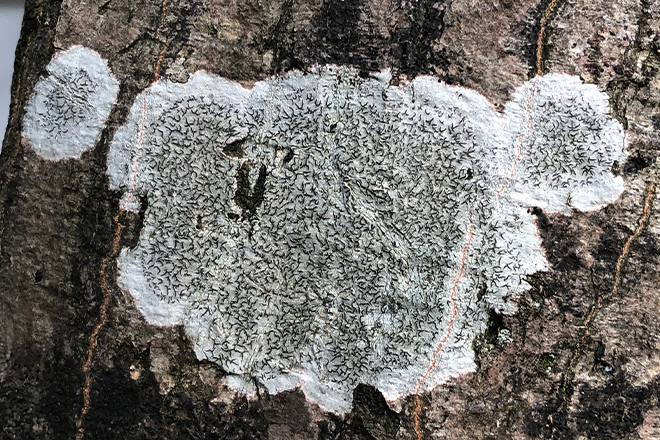
調布市のお寺の境内にて。固着地衣のモジゴケの仲間(村上さん撮影)
村上:モノサス13周年の創立記念で徳島県の自然スクール「トエック」にお邪魔したときに、地衣類の研究をしていた方からお話を伺ったんですね。それがきっかけで、生き物に対する興味を改めて思い出したことが、変わるきっかけになったのかなと思っているんですよね。
それまではなんでも自己完結しがちだったのですが、外の世界に興味をもったというか。“ぼっち”だったネット上でもつながりができたり、オンラインでもオフラインでも見る範囲、感じる範囲が広がりました。
杉本:ざっくり言うと、地衣類によって世の中の見え方が変わったと……。
村上:生き物の話を見ていくと、環境保全などでは若干政治的な話になったりするらしいんですけど。そういうとき、現場の人たち、あるいはその地域によって「正解」をつくっていくというか、落とし所を探っていくようなことがあるとだんだん知ってきて。「あ、私たちがやっている仕事もそうだな」と感じるようになったというか。以前、会社で適性診断みたいなものを受けたら「完璧主義者」って答えが出たんですけども。
杉本:その結果、わかりやすすぎです(笑)。次に同じテストを受けたら結果が違うかも?
村上:まあ、それはわからないんですけども、そういった部分についてちょっとは変化があったらいいなと思っています。
杉本:見える世界、感じる世界が変わるって、本当に大きな変化が起きているのでしょうね。だけど、そのきっかけが地衣類ってところが味わい深いですね。
村上:そうですね。それまでよく知らなかったものに触れた衝撃で、そのままはまってしまったんだと思います。自分が果たして生き物にどれほどの情熱をもち続けられるかはわかりませんが、さきほどお話した「誰か/何か」に、生き物に関する何かを据えたいという思いがあったりします。
杉本:村上さんと「生き物」のこれからがどうなっていくのか気になります……。ありがとうございました。
私が何か聞くたびに「そうですね」と一拍置いて、できるだけ正確に自分の考えを言葉にしようとしてくれた村上さん。なんだか、その佇まいで人を引き寄せるというか、ふしぎな引力がある気がしました。地衣類との出会いから3年、まだまだ村上さんの世界は変わっていく気配があります。。。またじっくりお話を聞かせてもらえる日を楽しみにしています。
